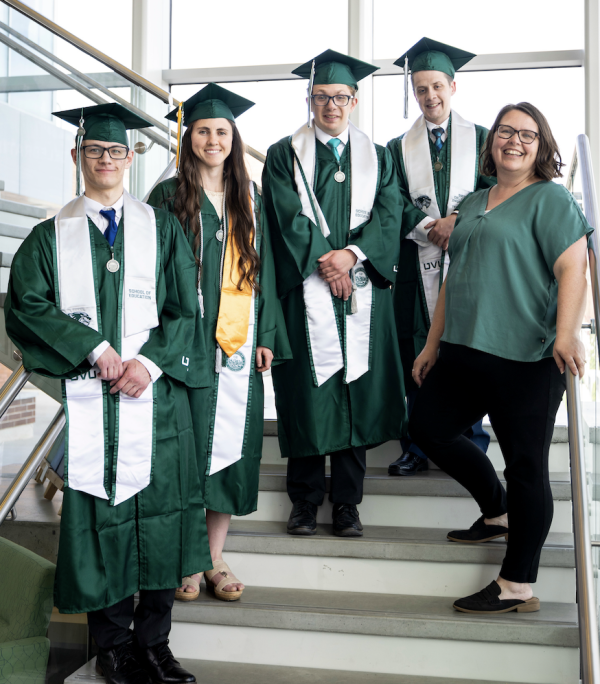You have /5 articles left.
Sign up for a free account or log in.
Syracuse University’s most recent graduates of the InclusiveU program, which supports students with intellectual and developmental disabilities.
Syracuse University
The number of students enrolled in higher education who have a disability has grown over the years, but they still face barriers in completing a certificate or credential. A May report from the U.S. Government Accountability Office found only 21 percent of students with disabilities graduate from college, compared to 38 percent of students who do not have a disability.
Colleges and universities have created specialized programs for students with intellectual or developmental disabilities to promote access to higher education and give wraparound supports for students’ unique needs.
Here are four examples of programs that provide certificates, peer support and campus engagement opportunities to neurodiverse learners.
Utah Valley University launched a three-year certificate program for young adults (ages 18 to 25) with intellectual disabilities in 2021, thanks to $1.9 million in grant funding from the U.S. Department of Higher Education. UVU graduated its first cohort of four students in spring 2024.

Utah Valley University’s inaugural graduate cohort from the Wolverines Elevated program for students with intellectual disabilities.
Utah Valley University
Students who successfully complete Wolverines Elevated (WE) earn a certificate in integrated college and community studies, which includes coursework on self-determination, independent living and career development. WE students can also pursue a second certificate from any offerings at the university.
As part of the program, students are assigned peer mentors who help with student success skills including time management and course management, as well as support navigating Canvas and connecting them to campus resources. Students can also hone their professional skills with job sampling and internships, either on campus or in the community.
At Syracuse University, students with intellectual and developmental disabilities can participate in a four-year program to earn a certificate in their area of interest by declaring a major, auditing inclusive classes and electives, and completing internships across campus. InclusiveU is a long-standing program at the university and nationally recognized for serving large numbers of students.
The program enrolls over 100 participants each year and invites learners to engage in all campus has to offer.
“Our students are embedded into campus life,” says Brianna Shults, InclusiveU director. “Our students take regular SU classes, live in campus residence halls with their peers and attend social events across campus.”
Nondisabled students serve as campus mentors who help with in-class accommodations such as note taking and studying.
Participant feedback highlights how participants have learned independence, become more confident and feel as though they belong on campus. Graduates also go on to seek competitive full-time employment.
Living on campus can be the first step in a college student learning to be independent, and the same is true for students with a disability. CCU offers a four-year nondegree program for students with mild to moderate intellectual or developmental disabilities called LIFE, first modeled off CarolinaLIFE at the University of South Carolina in 2008.
During the program, students receive support in their academic instruction and career education, as well as life skills and community engagement. A unique element of the program is its on-campus housing, which places students in four suites and 13 apartments, with 13 residential support staff who assist students with individual needs. Students can also opt to live off campus independently as they’re able.
Program participants can engage in all campus activities, including CCU courses, on-campus housing, student organizations, sporting events, work study and commencement. LIFE students also receive $10,000 in financial aid, regardless of need, and need-based grants between $7,500 and $10,000 annually.
All seniors in the program participate in a 30-hour-per-week internship, gaining 900 hours of work experience in two to three jobs throughout the year. In the past three years, 100 percent of LIFE graduates secured jobs within nine months of graduation.
CCU saw record participation with the fall 2023 class, welcoming 17 first-year students.
Boise State’s inclusive, two-year postsecondary program for students with intellectual disabilities, PEERS, graduated its first cohort of students in May 2023 with a certificate in community and career readiness.
PEERS (short for Providing Exceptional Education and Raising Standards) participants are enrolled in Boise State coursework for credit or as an audit, as well as taking PEERS-specific courses that are pass-fail.
As part of their coursework, students complete paid or unpaid job experiences, which can take place on or off campus, for at least six hours per week during their final three semesters. Three of the 2023 graduates worked at the Boise State Rec Center while earning their certificates.
Program graduates said they learned how to budget, to ask for help and to take each day in stride.
Seeking stories from campus leaders, faculty members and staff for our Student Success focus. Share here.








